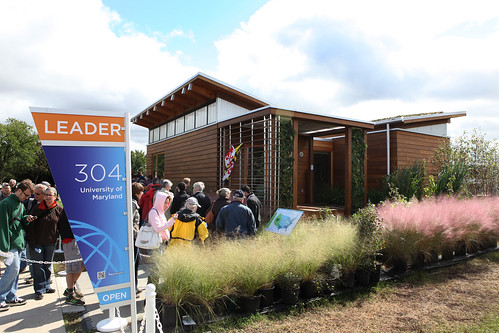It’s not often I get a fun AND informative expense paid weekend. Once again, thanks to the Plastics Make it Possible campaign for inviting me along to the Solar Decathlon in DC. I was honored to be included among such bloggers of awesomeness as Jetson Green, Dwell, Shawna Coronado and Ugly Duckling House .
The weather wasn’t exactly cooperative, but we struggled through it like troopers. The first home we toured with Brooks Utley was the Caltech Compact Hyper Insulated Prototype or CHIP. I’m not gonna lie. The interior was nice, but this house was alllll about the exterior for me. Anything that looks like a space ship is fabnificent in my book. The CHIP does not have any insulation, not because they are from sunny California and don’t need it. It’s because that funky puffy “siding” acts as the outsulation, a word they are trying to get into the dictionary. CHIP’s skin is made of heavy-weight (24oz/yrd) recycled white vinyl. White was used to reflect as much of solar radiation as possible, reducing cooling load. The “siding” is highly durable and waterproof.
Florida International University also had an impressive exterior. Their perFORM[D]ance House has layered walls designed to protect the house from undesired elements. Check out their website for energy performance on the walls and windows. It’s the louver system I want to discuss. The PVC and aluminum panels shade and protect the house as well as provide hurricane protection. Looks a bit nicer than the plywood or duct tape people were using here for Irene, no?
The winner of the 2011 Solar Decathlon was the University of Maryland with their Watershed project. They best utilized sustainable design for running the entire house.
Check out the home’s control panel with an easy button thrown in for good measure.
The dehumidifier is a work of art. The Innovative Liquid Desiccant Waterfall (LDW) system was developed by Maryland’s 2007 LEAFHouse team. A high-saline solution absorbs humidity from the air as it falls through back lit plastic “jellyfish”. It’s beautiful AND smart.
My personal favorite was New York’s Parsons School of Design. Not because I’m partial to NY (I am). Not even because I thought the house had the best overall design. It’s the story behind it that I fell in love with. The EmpowerHouse is a Habitat for Humanity home and of all the houses we toured, this one felt like a HOME. It’s probably because the lucky family who are inheriting the house were there on hand. Their photos were on display. This was actually someone’s home and I got a little verklempt when I met them.
My own honorable mention and the winner of the People’s Choice Award is Appalachian State’s Solar Homestead. Whereas some of the entries felt a bit cramped, this home had space and style. Once again, it was the exterior that blew me away.
The modular porch with outbuildings is kept dry by a bifacial PV canopy that acts as a net zero energy source for the home. The technology allows each 195 watt panel to collect sunlight bounced from below as well as above.
But honestly, the had me at the bark siding. Yes, this is durable and water resistant as long as it’s not sitting in a flood zone. The bad news is that it’s expensive.
Tomorrow I’ll fill you in on some other innovations I saw and easy DIY techniques we can steal for you kids to try at home. The bark included. Yum!










1 Comment
I grew up in a solar home that was one of the first solar homes built in my community. The solar panels kept the house nice and cozy (and it was cold where we lived!). We had something similar to the modular porch you show above, only it was actually a loft on the 4th story of our house. It’s awesome to see how far solar homes have came since my house was built in the 1980’s.